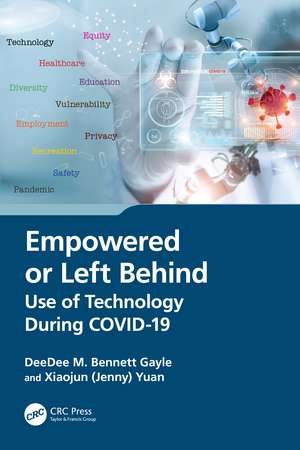Empowered or Left Behind: Use of Technology During COVID-19
Autor DeeDee M. Bennett Gayle, Xiaojun (Jenny) Yuanen Limba Engleză Paperback – 29 noi 2024
| Toate formatele și edițiile | Preț | Express |
|---|---|---|
| Paperback (1) | 297.81 lei 3-5 săpt. | +15.07 lei 4-10 zile |
| CRC Press – 29 noi 2024 | 297.81 lei 3-5 săpt. | +15.07 lei 4-10 zile |
| Hardback (1) | 331.22 lei 3-5 săpt. | +19.12 lei 4-10 zile |
| CRC Press – 14 iul 2023 | 331.22 lei 3-5 săpt. | +19.12 lei 4-10 zile |
Preț: 297.81 lei
Preț vechi: 372.27 lei
-20% Nou
Puncte Express: 447
Preț estimativ în valută:
56.99€ • 59.16$ • 47.52£
56.99€ • 59.16$ • 47.52£
Carte disponibilă
Livrare economică 04-18 martie
Livrare express 15-21 februarie pentru 25.06 lei
Preluare comenzi: 021 569.72.76
Specificații
ISBN-13: 9781032335001
ISBN-10: 1032335009
Pagini: 176
Ilustrații: 14
Dimensiuni: 156 x 234 x 13 mm
Greutate: 0.33 kg
Ediția:1
Editura: CRC Press
Colecția CRC Press
ISBN-10: 1032335009
Pagini: 176
Ilustrații: 14
Dimensiuni: 156 x 234 x 13 mm
Greutate: 0.33 kg
Ediția:1
Editura: CRC Press
Colecția CRC Press
Public țintă
Academic, Postgraduate, Professional, and Undergraduate AdvancedNotă biografică
Dr. Bennett Gayle is an Associate Professor and Director of the Extreme Events, Social Equity, and Technology (E2SET) Lab in the College of Emergency Preparedness, Homeland Security, and Cybersecurity at the University at Albany, State University of New York. Her interdisciplinary research focuses on the individual and household disaster impacts for vulnerable populations and how technologies may be leveraged to increase resilience. She has secured research grants and contracts, including from the National Science Foundation, Federal Emergency Management Agency, and the Department of Homeland Security. With over fifty publications, work is published in various journals, and she has presented at several conferences related to disasters, disability, diversity, wireless technology, and future studies. She is co-editor of an edited book volume on information behavior. Dr. Bennett Gayle received her Ph.D. from Oklahoma State University in Fire and Emergency Management. She has a unique academic background having received both her M.S. in Public Policy and B.S. in Electrical Engineering from the Georgia Institute of Technology.
Dr. Yuan is an Associate Professor and the Director of Human-Computer Interaction (HCI) Lab in the College of Emergency Preparedness, Homeland Security, and Cybersecurity at the University at Albany, State University of New York. Her research interests include both Human Computer Interaction and Information Retrieval, with the focus on user interface design and evaluation and human information behavior. Dr. Yuan has secured research grants and contracts from the Institute of Museum and Library Services, Department of Education in New York State and University at Albany. She published extensively in journals in information retrieval and human computer interaction, and conferences in computer science and information science, and is co-editor of the edited book volumeSocial Vulnerability to COVID-19: Impacts of Technology Adoption and Information Behaviorin publication with Springer Nature Publishing. She serves an Editorial Board member of Aslib Journal of Information Management (AJIM) and Annual Review of Information Science and Technology (ARIST), and a Board member of the International Chinese Association of Human Computer Interaction. Dr. Yuan received her Ph.D. from Rutgers University at School of Communication and Information, Ph.D. from Chinese Academy of Sciences in Institute of Computing Technology. She received her M.S. in Statistics from Rutgers University and M.E. and B.E. in Computer Application from Xi’an University of Science & Technology in China.
Dr. Yuan is an Associate Professor and the Director of Human-Computer Interaction (HCI) Lab in the College of Emergency Preparedness, Homeland Security, and Cybersecurity at the University at Albany, State University of New York. Her research interests include both Human Computer Interaction and Information Retrieval, with the focus on user interface design and evaluation and human information behavior. Dr. Yuan has secured research grants and contracts from the Institute of Museum and Library Services, Department of Education in New York State and University at Albany. She published extensively in journals in information retrieval and human computer interaction, and conferences in computer science and information science, and is co-editor of the edited book volumeSocial Vulnerability to COVID-19: Impacts of Technology Adoption and Information Behaviorin publication with Springer Nature Publishing. She serves an Editorial Board member of Aslib Journal of Information Management (AJIM) and Annual Review of Information Science and Technology (ARIST), and a Board member of the International Chinese Association of Human Computer Interaction. Dr. Yuan received her Ph.D. from Rutgers University at School of Communication and Information, Ph.D. from Chinese Academy of Sciences in Institute of Computing Technology. She received her M.S. in Statistics from Rutgers University and M.E. and B.E. in Computer Application from Xi’an University of Science & Technology in China.
Cuprins
Acknowledgment. About the Authors. Part I Government Response and Impacts. Chapter 1 Introduction: Primary and Secondary Effects of COVID-19. Chapter 2 COVID-19 US Response. Part II Technology Use across the Health Domains. Chapter 3 Businesses and Self-Employment. Chapter 4 Employment during COVID-19. Chapter 5 Education During COVID-19. Chapter 6 Access to Services and Resources. Chapter 7 Healthcare and Mental Health During COVID-19. Part III Unique COVID-19 Considerations and the Future Forward. Chapter 8 COVID-19 Mobile Applications. Chapter 9 Privacy and Security. Chapter 10 Conclusion. Index.
Descriere
Focused on the United States, this book summarizes the secondary impacts of COVID-19 due to the increased use of technology. Establishing the global response of social distancing, mandates for non-essential business, and working from home, the book centers on the disparate guidance provided at the State and local levels, domestically.
